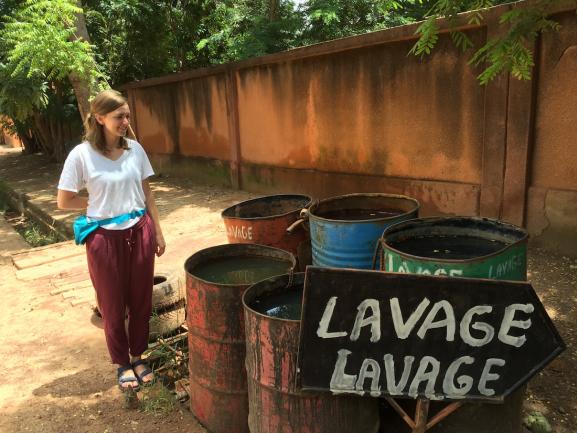Blythe Beecroft ’16
Global Health Research & Policy Analyst, Fogarty International Center, National Institutes of Health (NIH)

What drew you to Georgetown’s M.Sc. in Global Health program?
I was considering several programs and ultimately picked Georgetown’s M.S. in Global Health master’s program because of the development-oriented approach. I was also drawn to the Field Research Module and how it was actually a significant portion of the degree. I liked that there was a strong emphasis on applying what you learned in the classroom to the field.
What was the classroom instruction like?
My favorite courses were the “Demography and Health” policy electives. Instead of a traditional lecture, these classes involved reading leading experts in the field and having lengthy, in-depth class discussions. I really enjoyed this format. I also appreciated the “Development in Sub-Saharan Africa” class I was able to take through the School of Foreign Service.
Where did you complete your field research module and what was your project?
I did my Field Research Module in Ouagadougou, Burkina Faso with L’Institut Supérieur des Sciences de la Population (ISSP) at the University of Ouagadougou. Due to the political coup that happened in the middle of my module, I was relocated and finished my research in Navrongo, Ghana. My project investigated inequalities in childhood vaccinations across formal and informal neighborhoods in Ouagadougou. I found that children in informal (slum) neighborhoods were just as likely to be vaccinated, but were more likely to receive delayed vaccinations than children in formal neighborhoods. I also identified a few socioeconomic factors that contributed to this trend.
What did you learn from the experience abroad?
My experience abroad was very unusual given the political situation in Burkina Faso at the time. I learned about the importance of being flexible and adaptable. I also appreciated the chance to see how research is conducted in the field and observe the real barriers and challenges to collecting data. I definitely learned that my French grammar could use some work!
What has been your career path since completing the program?
Since completing the program, I have worked at the National Institutes of Health (NIH) at the Fogarty International Center (FIC) as a Global Health Research and Policy Analyst.
What opportunities were afforded by attending graduate school in Washington, DC?
I think Washington, DC really is a hub for global health and you get unique exposure to very important NGOs, international organizations, and think-tanks. There are opportunities to attend seminars and meetings that you wouldn’t get anywhere else. For example, I was writing a paper on MDR Tuberculosis for my Health Policy class. While writing the paper I got to attend a presentation at the Center for Global Development, reviewing current research that had been conducted on MDR-TB in a study and its impact. That experience really clicked for me. This is one example of how I was able to supplement what I was learning at Georgetown with additional presentations, meetings, and seminars in the city that exposed me to a variety of different organizations. I think you also get better picture of the multifaceted nature of global health work.
Would you recommend Georgetown’s M.S. in Global Health master’s program to a budding global health professional?
Yes, I think the program teaches you the skills you need in the field of global health, but also allows you to think and apply those skills in a greater global context.
